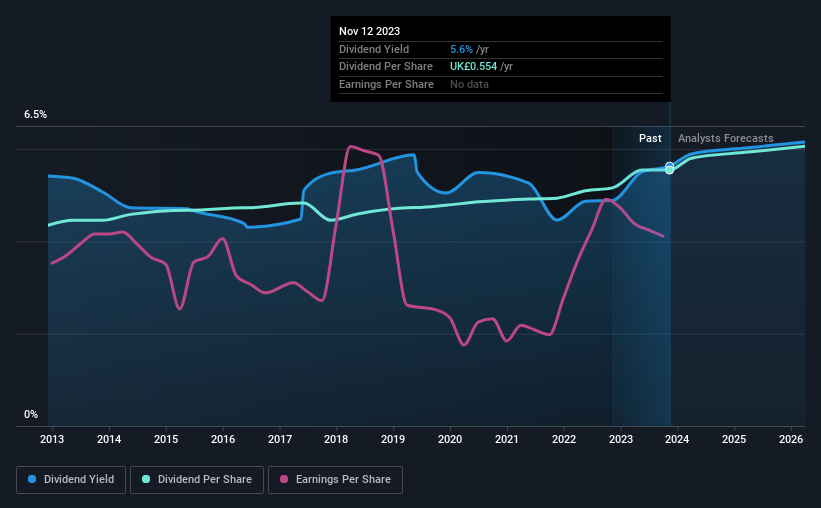- United Kingdom
- /
- Other Utilities
- /
- LSE:NG.
National Grid's (LON:NG.) Dividend Will Be Increased To £0.194

The board of National Grid plc (LON:NG.) has announced that the dividend on 11th of January will be increased to £0.194, which will be 8.7% higher than last year's payment of £0.178 which covered the same period. This takes the dividend yield to 5.6%, which shareholders will be pleased with.
Check out our latest analysis for National Grid
National Grid's Dividend Is Well Covered By Earnings
While it is great to have a strong dividend yield, we should also consider whether the payment is sustainable. Before making this announcement, National Grid was paying out quite a large proportion of both earnings and cash flow, with the dividend being 593% of cash flows. Paying out such a high proportion of cash flows can expose the business to needing to cut the dividend if the business runs into some challenges.
Looking forward, earnings per share is forecast to rise by 12.9% over the next year. Under the assumption that the dividend will continue along recent trends, we think the payout ratio could be 74% which would be quite comfortable going to take the dividend forward.

National Grid Has A Solid Track Record
The company has been paying a dividend for a long time, and it has been quite stable which gives us confidence in the future dividend potential. The annual payment during the last 10 years was £0.435 in 2013, and the most recent fiscal year payment was £0.554. This works out to be a compound annual growth rate (CAGR) of approximately 2.5% a year over that time. Slow and steady dividend growth might not sound that exciting, but dividends have been stable for ten years, which we think makes this a fairly attractive offer.
Dividend Growth May Be Hard To Come By
Investors could be attracted to the stock based on the quality of its payment history. However, initial appearances might be deceiving. Over the past five years, it looks as though National Grid's EPS has declined at around 6.9% a year. Declining earnings will inevitably lead to the company paying a lower dividend in line with lower profits. Earnings are forecast to grow over the next 12 months and if that happens we could still be a little bit cautious until it becomes a pattern.
The Dividend Could Prove To Be Unreliable
Overall, this is probably not a great income stock, even though the dividend is being raised at the moment. We can't deny that the payments have been very stable, but we are a little bit worried about the very high payout ratio. We would be a touch cautious of relying on this stock primarily for the dividend income.
Market movements attest to how highly valued a consistent dividend policy is compared to one which is more unpredictable. However, there are other things to consider for investors when analysing stock performance. Just as an example, we've come across 2 warning signs for National Grid you should be aware of, and 1 of them makes us a bit uncomfortable. Is National Grid not quite the opportunity you were looking for? Why not check out our selection of top dividend stocks.
Valuation is complex, but we're here to simplify it.
Discover if National Grid might be undervalued or overvalued with our detailed analysis, featuring fair value estimates, potential risks, dividends, insider trades, and its financial condition.
Access Free AnalysisHave feedback on this article? Concerned about the content? Get in touch with us directly. Alternatively, email editorial-team (at) simplywallst.com.
This article by Simply Wall St is general in nature. We provide commentary based on historical data and analyst forecasts only using an unbiased methodology and our articles are not intended to be financial advice. It does not constitute a recommendation to buy or sell any stock, and does not take account of your objectives, or your financial situation. We aim to bring you long-term focused analysis driven by fundamental data. Note that our analysis may not factor in the latest price-sensitive company announcements or qualitative material. Simply Wall St has no position in any stocks mentioned.
About LSE:NG.
National Grid
National Grid plc transmits and distributes electricity and gas.
Slight with moderate growth potential.
Similar Companies
Market Insights
Community Narratives



